

Look before you eat - Reconciliation Australia. On your trip to the average Australian supermarket, you can find kangaroo next to the beef and sausages, kakadu plum hand cream in the toiletries aisle, and even lemon myrtle air freshener along with the cleaning products.
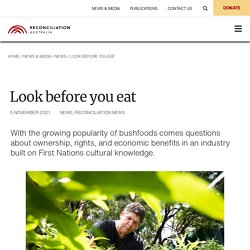
In an increasingly health-conscious public, with the rise of wellness influencers and environmental concerns, finding the next acai berry, quinoa or manuka honey has the potential to rock the food market. Especially if this product claims to be ethical. Factsheet nagoya en. Te hī ika: How Māori fishing rights were saved – but only just. Thirty years on from the landmark fisheries settlement – the first ever pan-iwi settlement – Māori interests in fisheries are established and indisputable.
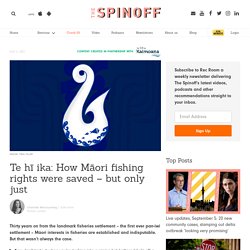
But that wasn’t always the case. You don’t taste it when you’re tucking into a piping-hot battered hoki off a bed of chips and newspaper, gulping down half-shell Bluff oysters, or devouring a helping of toroi at your marae wharekai, but kaimoana has had a tumultuous history. Māori have been sustainably fishing our waters for hundreds of years.
A vital food source, kaimoana was divided among hapū and whānau, and traded and gifted between iwi. State of the World's Minorities and Indigenous Peoples 2012 - Case study: Sami rights to culture and natural resources. In January 2011, James Anaya, the UN Special Rapporteur on the rights of indigenous peoples, issued his report on the human rights situation of the Sami indigenous people living in the Sápmi region of Norway, Sweden, Finland and Russia.
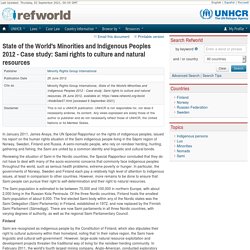
A semi-nomadic people, who rely on reindeer herding, hunting, gathering and fishing, the Sami are united by a common identity and linguistic and cultural bonds. Reviewing the situation of Sami in the Nordic countries, the Special Rapporteur concluded that they do not have to deal with many of the socio-economic concerns that commonly face indigenous peoples throughout the world, such as serious health problems, extreme poverty or hunger. In particular, the governments of Norway, Sweden and Finland each pay a relatively high level of attention to indigenous issues, at least in comparison to other countries.
Victorian Traditional Owners launch Australia’s first cultural landscape strategy. A first of its kind strategy has been released today by Victorian Traditional Owners in collaboration with the state government which gives Indigenous people more say when it comes to environmental management.

The aims of the strategy will see actions taken to systematically enable Victorian Traditional Owners to lead planning and activate cultural knowledge and practices to manage Country. Federation of Victorian Traditional Owner Corporations CEO, Paul Paton said the significance of the strategy was that it allowed Indigenous people to become a part of decision-making more than ever before. “Our cultural landscapes are deeply significant for community and this strategy will play a big part in sharing decision-making powers, reforming systems and removing barriers,” said Mr Paton.
“Today marks an important step towards reconciliation and treaty, and sets guidelines for Traditional Owners to, once again, care for Country.” Aboriginal Affairs NSW - NSW Aboriginal Languages Legislation. Ancient sites, rainbow serpents raise risks for Australian miners. Related Article “Fundamentally, the investment community needs to be worried because this places risk on projects,” Bergmann said.
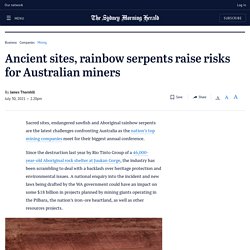
The government says it was still drafting the bill, and had already made several revisions based on feedback from stakeholders. Rio, the world’s biggest iron-ore miner, said it is giving cultural heritage and environmental issues a higher priority in the wake of Juukan Gorge and has set up an indigenous advisory committee to improve its engagement with local communities. The London-based company said in April it had reviewed over 1300 sites in the Pilbara for their potential impact on cultural heritage, with subsequent additional safeguards resulting in 54 million tonnes of dry ore being removed from its reserves. Free, prior and informed consent. 2020: The year of reckoning, not reconciliation - Griffith Review. Image credit: John Janson-Moore IN WIRADJURI LANGUAGE, my native tongue, Gari Yala means ‘speak truth’.
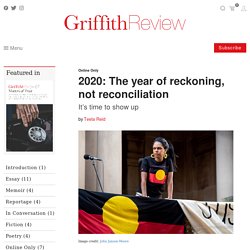
Speaking truth is a hard task when you live in a country that denies the truth of its past. If you listen to Aboriginal and Torres Strait Islander peoples ‘from all points of the southern sky’,[i] Gari Yala talk is omnipresent. So as 2020 strikes, marking 250 years since the invasion of Indigenous lands, is Australia ready to Gari Yala and reckon with its past? Let’s be clear: Captain Cook did not ‘discover’ the continent known as Australia. From the Kalahari to Court. More unmarked residential school graves discovered in Canada. Warning: The story below contains details of residential schools that may be upsetting.
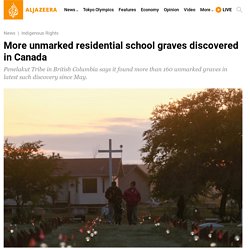
Canada’s Indian Residential School Survivors and Family Crisis Line is available 24 hours a day at 1-866-925-4419. More than 160 “undocumented and unmarked graves” have been discovered at the site of a former residential school on Canada’s west coast, an Indigenous community has announced, as the number of graves linked to the forced-assimilation institutions continues to rise. The Penelakut Tribe said in a statement shared on social media that the graves were found in their territory, where the Kuper Island Industrial School operated between 1890 and 1975. “It is impossible to get over acts of genocide and human rights violations. Indigenous voice may be lost if rushed to referendum: Langton.
The Australian Digital Subscription + The Weekend Australian (delivered Saturday) billed for the first 12 months at $32 approximately every 4 weeks.

Min cost $416. At the end of the initial 12 months, subscription will automatically renew to be billed $40 approximately 4 weekly. No cancellations during the first 12 months. AICM. Indigenous Peoples. Back to What We Do There are 370 million Indigenous people around the world and spread across more than 90 countries.
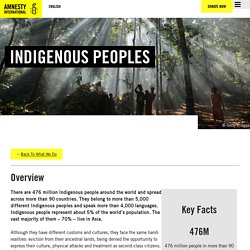
They belong to more than 5,000 different Indigenous peoples and speak more than 4,000 languages. Indigenous people represent about 5% of the world’s population. Indigenous Peoples 2020. PFAS contamination class action filed by Jervis Bay community for cultural loss. An Aboriginal community has launched a class action against the Federal Government claiming chemical contamination on their land from Department of Defence operations has "destroyed" their livelihoods.
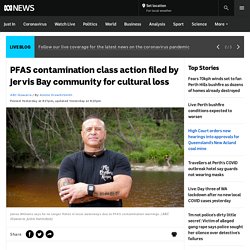
Key points: The Wreck Bay Aboriginal community and surrounding villages are claiming damages for cultural losses due to PFAS contaminationResidents have lodged a class action in the Federal CourtThe chemicals are found in firefighting foams used on neighbouring Defence facilities for decades The residents of Wreck Bay, on the New South Wales south coast, allege Defence negligently allowed perfluoroalkyl and polyfluoroalkyl (PFAS) chemicals to leech into surface water, groundwater, and soil. Victoria just gave 2 billion litres of water back to Indigenous people. Here's what that means for the rest of Australia. For the first time in Victoria’s history, the state government has handed back water to traditional owners, giving them rights to a river system they have managed sustainably for thousands of years.
The two billion litres of water returned to the Gunaikurnai Land and Waters Aboriginal Corporation (GLaWAC) this month means traditional owners can now determine how and where water is used for cultural, environmental or economic purposes. The decision recognises that water rights are crucial for Indigenous people to restore customs, protect their culture, become economically independent and heal Country. Why were Indigenous Australians not offered a treaty in 1788? - Nightlife - ABC Radio. Australia's plants and animals have long been used without Indigenous consent. Now Queensland has taken a stand. Many products we use each day contain compounds taken from nature. Aspirin, for example, is derived from willow trees. And nanofibres from spinifex grass in Queensland is added to bitumen to make stronger roads. But throughout history, native plants, animals and other biological materials have been removed without the consent of Indigenous people.
In many cases, Indigenous knowledge was also taken without permission – and Indigenous people rarely benefited from the commercial products developed as a result.